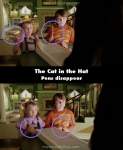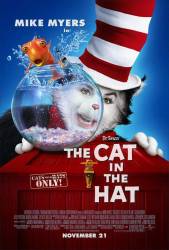
Continuity mistake: In the scene where Conrad and Sally are signing the contract, they have the pens in their hands, but when Cat says, "Give me five!" the pens have disappeared.
Continuity mistake: The first time Lawrence comes in (as the trio are jumping on the couch), he starts sneezing while standing under the Cat. He's in the middle of the living room and facing the front entry; but in the next shot, he's on the edge of the living room and facing in. He jumps back and forth throughout the scene.
Continuity mistake: After Conrad tosses the candy to distract the kids, the one that hit Cat in the groin is in the foreground to get some candy. After a quick cut scene, he's standing triumphantly behind the other kids with his arms raised.
Continuity mistake: As Cat yells, and after the swinging sequence, the kids are dropping their piñata bats. As the camera cuts to a few shots of close ups on the kids, you see no bats in their hands. After the shot widens out, you see the kids drop their bats again.
Continuity mistake: In the scene at the birthday party, when the trio is at the window looking inside a shot shows them turning and yelling. It goes to another zoomed out shot, but they turn a second time.
Continuity mistake: In the scene where Alec Baldwin is in the house to discuss Conrad going to military school he is dressed for work. He puts his briefcase down and sets his sunglasses on top of it. In the next scene the glasses are behind and to the side of the case and in the next scene they are back on top of the case. And so on.
Continuity mistake: When Larry first arrives at the house there is a screen door attached to the front door, which he holds open. In all other scenes the screen door is gone.
Plot hole: In the scene at the little girl's party where Cat is the pinata, and he gets whacked in the groin, he screams out loud, all the kids hear him, you even see their shocked faces as well. But after Conrad and Sally throw the lollies, the kids totally forget about Cat yelling - hardly likely given the level of shock. As well as that, wouldn't the kids have noticed that the Cat didn't have a hole in it when they saw the lollies? They just came from behind a bush. And to top it all off, in the scene where all the kids are greedily on the ground grabbing the lollies, and the Cat's about to hit the kid that whacked him, in the bottom left corner, a little girl looks directly at the Cat, Conrad and Sally.
Continuity mistake: When Conrad, Sally, and the Cat are jumping up and down on the sofa, on the table next to the sofa, the book next to the lamp keeps changing position. It's close to the lamp, then near the lamp, sideways, longways all during the scene.
Plot hole: When Conrad, Sally and the Cat pull up to the house the camera cuts after they stop. The Cat is suddenly missing, and as the kids go up on the porch, Lawrence pops up from beside the porch. First, how did he beat them there, when he was a couple of minutes behind? Second, when the kids were approaching the house, how did they not see Lawrence crouching beside the porch when he would have been in plain sight from the direction of the driveway?
Continuity mistake: In the scene, 20 minutes before the end of the movie, where the cat is dancing in a rave, the pretty girl he is dancing with wears her top on her shoulders when seen from the front, but off her shoulders when seen from behind.
Other mistake: While signing the contract, when Conrad is supposed to "sniff this", he moves to his position a second before the Cat says his line and bobs Conrad's head down.
Continuity mistake: As Sally, Conrad, and the Cat look in the window of the house at the birthday party, a house next door is reflected. However, when the camera looks out at them, there's no house behind them.
Continuity mistake: After the dog is secured and the kids and Cat are running, at one point Lawrence is only about thirty feet behind them. When they get into one of the kiosks, Lawrence is nowhere near, and so couldn't have known where they went. But a minute later, he's sliding down the pole and pushing through the crowd in the party area after the trio.
Continuity mistake: When the Cat is on the picket fence, during the close ups of him, he has his elbows on the fence. When the camera is on Sally, you can see his right hand on the fence, instead of his elbow.
Continuity mistake: When the Hummer comes out of the garage, it looks normal. When the shot cuts to the kids and then back, look at the back right wheel. You can see the back wheel of the S.L.O.W., and the end of the exhaust pipe.
Continuity mistake: When the Cat goes to "look under the hood", he looks back over his shoulder at the kids after passing gas. You can see the definite line of white on his face that is well short of the hairline. The next time that you see his face, the white goes all the way into the hairline.
Character mistake: After the things let the dog out, Larry calls Joan and tells her that the kids let him out, and he will get him (the dog). Later, when he's downtown with the dog, he has the line about "when Joan finds out you've escaped, Conrad's out and I'm in". Where is the surprise? He already called her, so she knows!
Factual error: When driving the S.L.O.W., the Cat tells Conrad to "punch it!". When he (Conrad) does so, the Cat squashes up against the windshield. This goes against physics. Unless they were going backwards, he would have been pressed into the seat.
Continuity mistake: After the Cat, Sally, and Conrad get into the S.L.O.W., the Cat goes from having no goggles on preparing to leave, to having goggles on when pulling out. For the rest of the S.L.O.W. shots, he has no goggles.






Chosen answer: Theodor Seuss Geisel, or Dr. Suess as we know him, published most of his books between the late 1930's and the late 1980's. "The Cat in the Hat" was first published in 1957. Dr. Seuss' works generally tell the stories of fantastical characters in imaginary places, meant to be timeless. Illustrations and animated adaptations show buildings and objects with unusual proportions, odd shapes and bizarre functions. The live action film of "The Cat in the Hat, " however, is rooted to reality by its decidedly human child protagonists in an ordinary house in an ordinary neighborhood. The production design, costume design and set decoration of the 2003 film seem also to have the goal of achieving a certain timelessness. No date reference is given. However, there a decidedly stylized quality of 1950's-1960's suburban architecture and design, complete with its generic forms, chimneys, picket fences, and colors such as yellows and avocado greens, reflecting the common decor of the time. Similar to the 1971 TV short, which seems to provide a reference point for the design aesthetic of the film, nothing appears exceedingly futuristic nor rooted in period styles like victorian or colonial. I have also posed your question to Rita Ryack, the film's costume designer, whom I found on Facebook. If she sees my questions and decides to respond, I will add her insights to this answer.